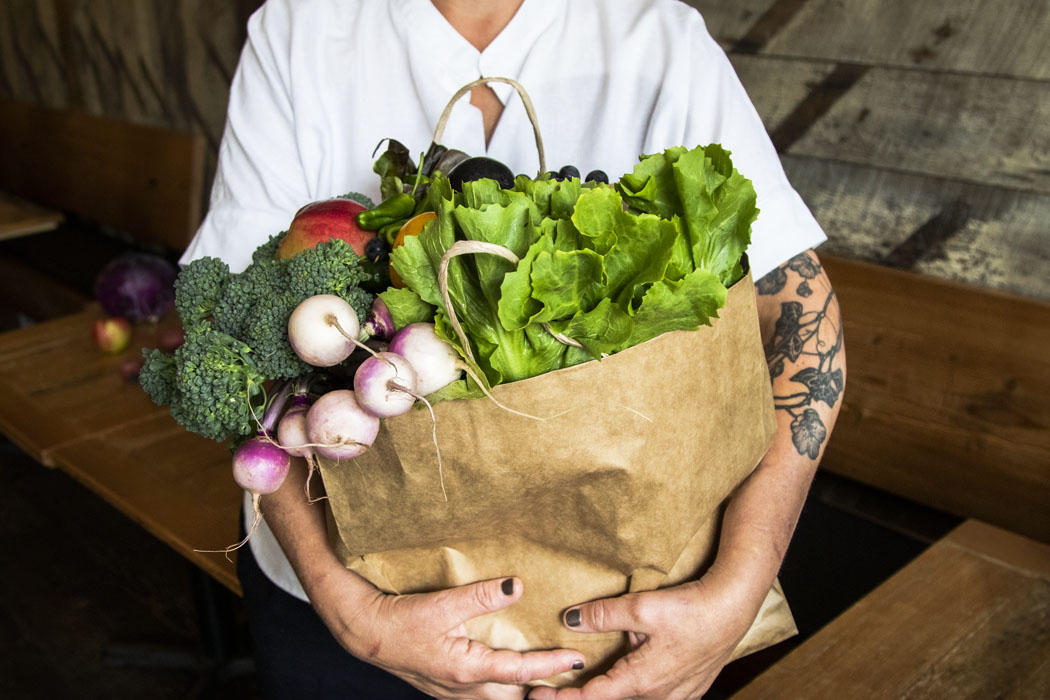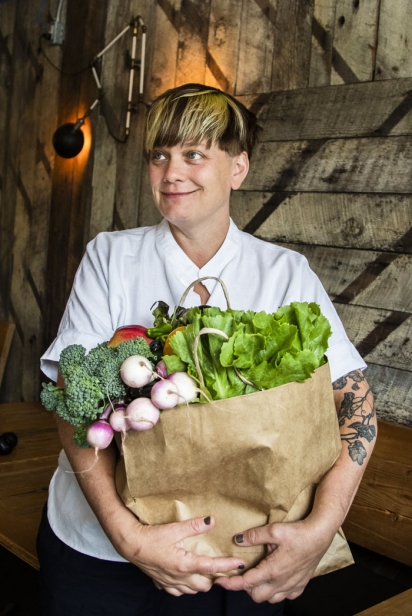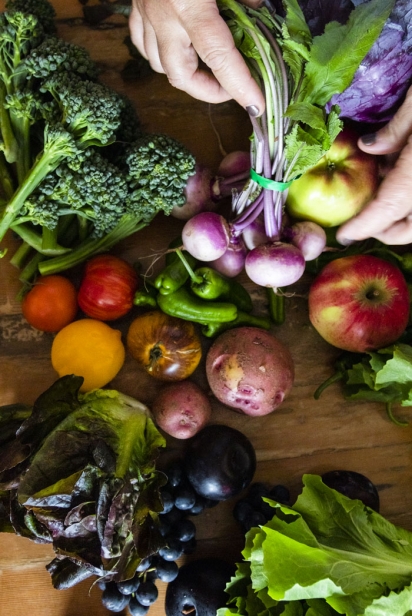Food for Folks
Susan Davidson has been a member of the Glorious Organics, a co-operative farm in Aldergrove since 1986. At 76, she picks what she can and manages restaurant sales, which account for 60 per cent of the farm’s business. Then in March, when COVID came to Vancouver, she watched the entire restaurant industry shut down overnight taking with it a huge chunk of the co-op's supply chain.
“It's not like we haven't had to respond to challenges, but this is not that. This is the whole world. This is something new entirely,” Davidson says.
What saved the farm's bacon was the CSA — community supported agriculture — program at Harvest Community Foods in Vancouver.
For seven years, Harvest has offered bi-weekly CSA bags out of its small Union Street market and noodle soup café. The program had a reliable, albeit small, following, but it expanded when the pandemic hit and people feared going to the grocery store and wanted to find ways to support local businesses that were all but shut down.
For Andrea Carlson, owner of Harvest and the ever-popular Main Street restaurant, Burdock & Co, that meant an increase in CSA bag sales — jumping from 40 bi-weekly to 400 each week at its peak.
“The biggest reason we wanted to promote [CSA sales] when COVID hit was because of the impact it was having on the entire chain of people that we deal with,” Carlson says. “You know those farmers no longer had anyone to sell to and they were just starting their harvest season.”
Traditionally, CSAs allow customers to pre-purchase produce from a specific farm before the harvest season begins. You spend say $400 in April and collect your fresh produce every week during the harvest season.
Where Carlson’s model deviates from tradition is instead of sourcing from one farm, she and Harvest manager, Gabriella Meyer, source from multiple farms, including Glorious Organics. The bags cost $38 and customers have to order by 3:00 p.m. on Tuesday to be able to pick up their bag on Wednesday or Thursday of that same week.
“We've been shifting our focus from week to week to different farms so we were giving everyone some coverage,” Carlson says. “For smaller restaurants, it's generally a modest purchase that you're making from small growers, but with the CSA model, we were doing upwards of $12,000 per week in produce purchases, which is really significant for us and for the growers.”
Carlson isn’t the only restaurateur who made a switch to groceries, many restaurants turned into grocers, supplying the basics, such as flour, vegetables and even toilet paper. For Jennifer McCarthy of Bluhouse Market and Café in Deep Cove, the pandemic allowed her to realize an underutilized part of her business.
“When we envisioned Bluhouse, we always hoped it would have a community-market component, but if we didn't have the traction from the community it meant that we couldn't make it work for everybody. Now we can,” McCarthy says.
Bluhouse is best known as a café, but it has always had a market component that focuses on organic, sustainable and, when possible, local goods and produce. Mccarthy’s vision when she opened Bluhouse was to have a “real throwback old-school community general store,” but pre-COVID it never quite took off.
When the pandemic started, McCarthy realized she had the potential to play a vital role in her community by offering local and organic groceries for delivery or curbside pickup. She tried to do a CSA bag, much like Carlson, but the community wasn’t as enthusiastic about it, so she decided to create an online store with more than 500 products.
“It's like, ‘Oh my goodness, it took six years and a pandemic to finally get what we would always hoped we would have,’” McCarthy says. “I often wondered if we were missing an opportunity by not having an online cart, but the hurdle to make it all happen just seemed so big.”
Like Bluhouse, retailers aren’t the only ones who had to make massive shifts in their business to even attempt to survive. Back at Glorious Organics, the changes came down to the very seeds planted.
“Food for folks” is the philosophy Davidson and field manager, Mark Cormier took on when it came to planting in the spring. Before COVID, they focused on planting specialty crops that catered to the tastes of high-end chefs. When COVID hit, they decided to plant more ‘kitchen-friendly’ varietals that yielded higher quantities at lower prices.”
"I would say flexibility is the new normal and I think the word 'pivot' has taken on a whole new lexicon in our vocabulary,” Davidson says. “We didn’t plant fine filet beans that we would normally be able to sell to restaurants at $12 a pound. Instead, we planted green beans that we can sell for $6 a pound because it's food for folks.”
The quick changes Carlson, McCarthy and the people at Glorious Organics made helped push them through the initial stages of the pandemic, but some hard realities could still impact their bottom lines. For Carlson, a drop in CSA bag sales, which she experienced in the summer, could put the business back in danger.
“Because there was such a huge interest in the CSA, we saw an increase in sales, but the profit margin is really negligible and doesn't have the same margins as our food program,” Carlson says. “Because we have an overall increase in sales, yet with a decrease in revenue, we didn't qualify for any of the funding from the government, so that was a bit of a drag.”
McCarthy is facing a similar potential problem as the summertime has brought back some tourist traffic (one person at a time), which she says has given the illusion to the community that she is back to being busy.
“The community came out in the beginning and supported us because they could see that we weren't busy,” McCarthy says. Then the weather got nice and we got a little busy and the community was so happy to see that, but it's a bit of a double-edged sword because we aren't as busy as we were last year and the volume has changed drastically.”
No one knows how it’s going to work this fall and winter. For Carlson and McCarthy, the survival of their businesses relies on the consistent support of the community and, ultimately, a more permanent change in consumer behaviour.
“I think there has been a lot of change in consumer behaviour and retailer behaviour because people had to give us some of their trust that they would have to pick their groceries to their satisfaction,” McCarthy says. “Everybody likes to squeeze their own pear, right?”
Bluhouse Market and Café
4342 Gallant Ave., North Vancouver, B.C.
bluhousecafe.com | 778.340.6667 | @bluhousecafe
Glorious Organics
1374 256 St., Aldergrove, B.C.
gloriousorganics.com | 604.857.1400 | @gloriousorganics
Harvest Community Foods
243 Union St., Vancouver, B.C.
harvestunion.ca | 604.682.8851 | @harvestunion








